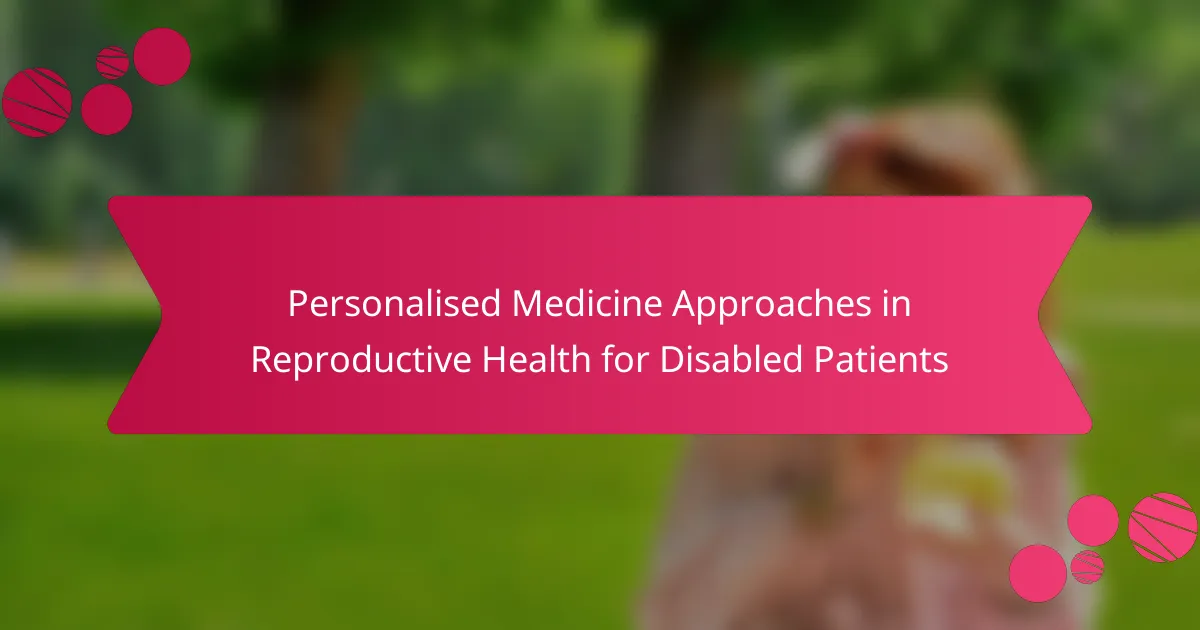Personalized medicine approaches significantly improve reproductive health outcomes for disabled patients by tailoring interventions to individual needs. These strategies address unique challenges, enhance access to care, and integrate advanced technologies like genetic screening and telemedicine. Additionally, cultural perceptions and ethical considerations shape the effectiveness of these personalized interventions, ensuring that care is respectful and equitable. By focusing on individualized treatment plans, healthcare providers can better support the reproductive health needs of disabled individuals.
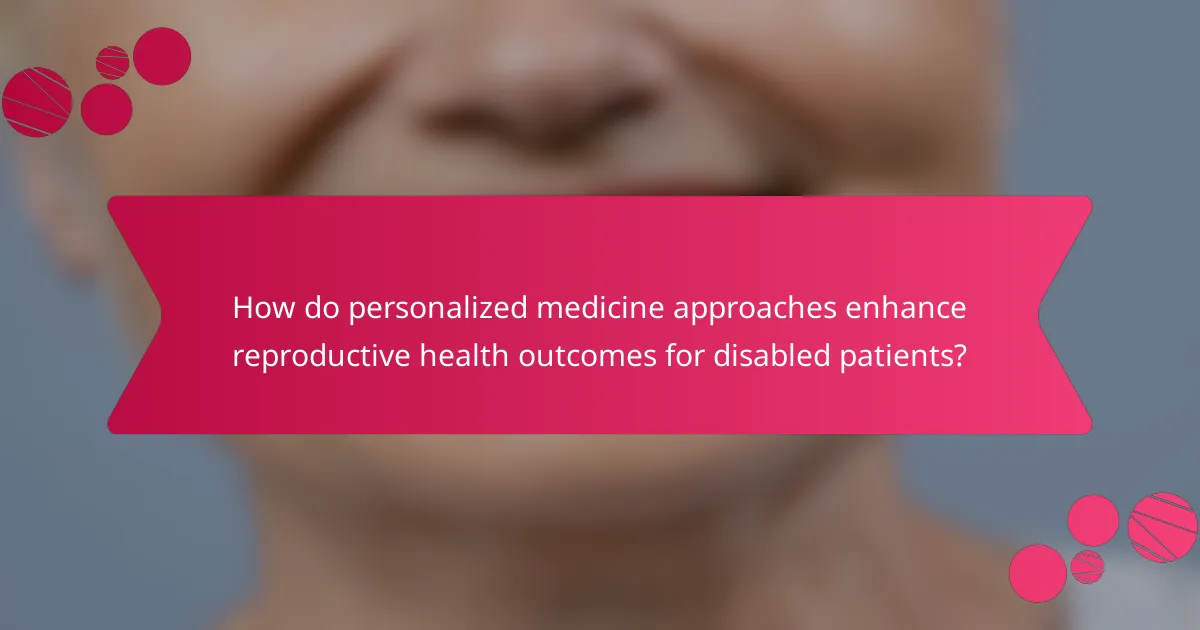
How do personalized medicine approaches enhance reproductive health outcomes for disabled patients?
Personalized medicine approaches significantly enhance reproductive health outcomes for disabled patients by tailoring interventions to individual needs. These strategies consider unique genetic, environmental, and lifestyle factors, leading to improved fertility management and pregnancy care. For instance, genetic screening can identify specific risks, allowing for targeted therapies. Additionally, personalized treatment plans can mitigate complications, ensuring safer pregnancies for disabled individuals. Integrating technology, such as telemedicine, further supports access to specialized care, addressing barriers faced by disabled patients. Overall, personalized medicine fosters better health outcomes by prioritizing individual circumstances and preferences.
What are the key components of personalized medicine in reproductive health?
Personalized medicine in reproductive health for disabled patients includes genetic profiling, tailored treatment plans, and individualized counseling. These components enhance reproductive outcomes by addressing specific needs and genetic backgrounds. Genetic profiling identifies inherited conditions, while tailored treatment plans consider unique health challenges. Individualized counseling provides emotional support and education, fostering informed decision-making.
Why is individualized treatment essential for disabled patients in reproductive health?
Individualized treatment is essential for disabled patients in reproductive health because it addresses unique needs and improves outcomes. Personalized medicine tailors interventions based on individual characteristics, enhancing care effectiveness. Disabled patients often face specific reproductive challenges, such as hormonal imbalances or physical limitations, that require customized approaches. Research indicates that personalized strategies can lead to higher satisfaction and better health results for these individuals. By focusing on unique attributes, such as medical history and personal preferences, healthcare providers can create more effective and supportive reproductive health plans.
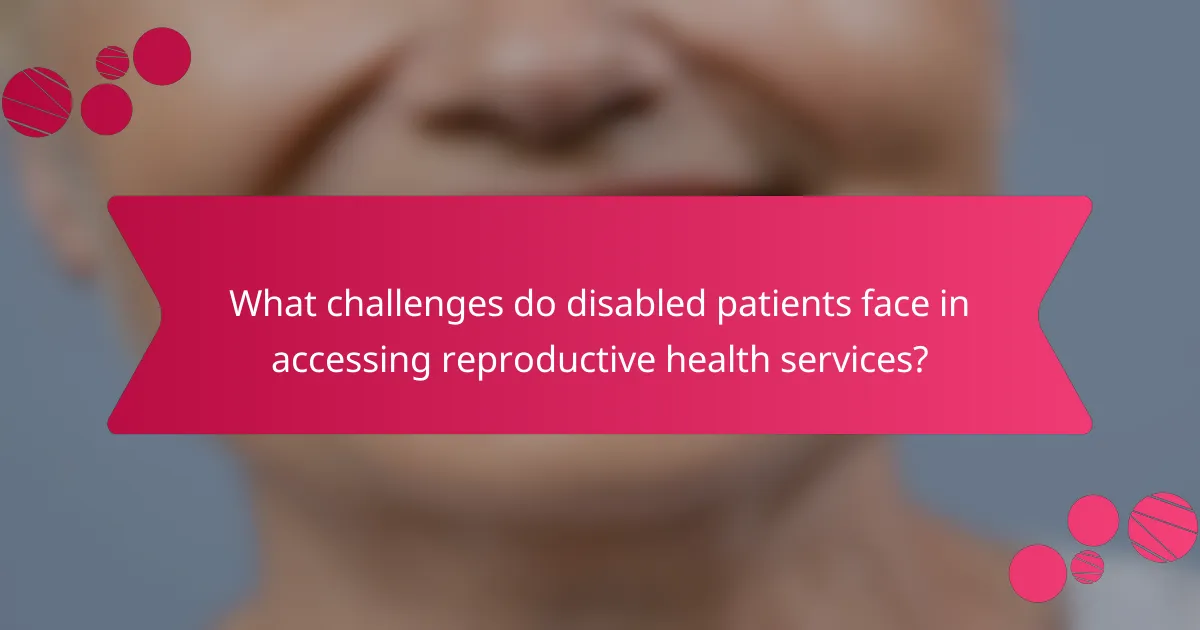
What challenges do disabled patients face in accessing reproductive health services?
Disabled patients face significant challenges in accessing reproductive health services, including physical barriers, lack of tailored information, and inadequate provider training. These obstacles can lead to disparities in care and outcomes.
Physical barriers often include inaccessible facilities and equipment, which hinder disabled individuals from receiving necessary services. Additionally, many healthcare providers lack training in addressing the specific needs of disabled patients, leading to misunderstandings and inadequate care.
Furthermore, disabled patients may struggle with the availability of personalized medicine approaches that cater to their unique reproductive health needs. This lack of customization can result in suboptimal treatment options and limited access to reproductive health education.
Efforts to improve access must focus on enhancing facility accessibility, providing comprehensive training for healthcare providers, and developing personalized medicine strategies that address the diverse needs of disabled patients.
How do physical disabilities impact reproductive health needs and options?
Physical disabilities significantly influence reproductive health needs and options. Personalized medicine approaches address these unique challenges by tailoring interventions based on individual circumstances.
Disabled patients may face barriers such as limited access to healthcare services and specialized reproductive health education. Personalized medicine can enhance care by considering physical limitations and specific health conditions. For instance, adaptive reproductive technologies can improve access for individuals with mobility impairments.
Moreover, mental health plays a crucial role in reproductive health for disabled patients. Personalized approaches can integrate psychological support, addressing emotional well-being alongside physical health needs. This holistic view fosters better reproductive health outcomes.
Finally, collaboration among healthcare providers is essential. Interdisciplinary teams can ensure that all aspects of a disabled patient’s reproductive health are considered, leading to more effective and comprehensive care.
Which barriers hinder disabled patients from receiving personalized reproductive care?
Barriers hindering disabled patients from receiving personalized reproductive care include physical accessibility, communication challenges, and lack of tailored services. These obstacles prevent effective engagement with healthcare providers.
Physical accessibility remains a significant issue, with many facilities lacking adequate accommodations. Communication barriers arise from healthcare professionals’ insufficient training in addressing the unique needs of disabled patients. Additionally, a lack of personalized services often leads to generalized care that does not meet individual requirements.
These combined factors contribute to disparities in reproductive health outcomes for disabled individuals. Addressing these barriers is essential for ensuring equitable access to personalized reproductive care.
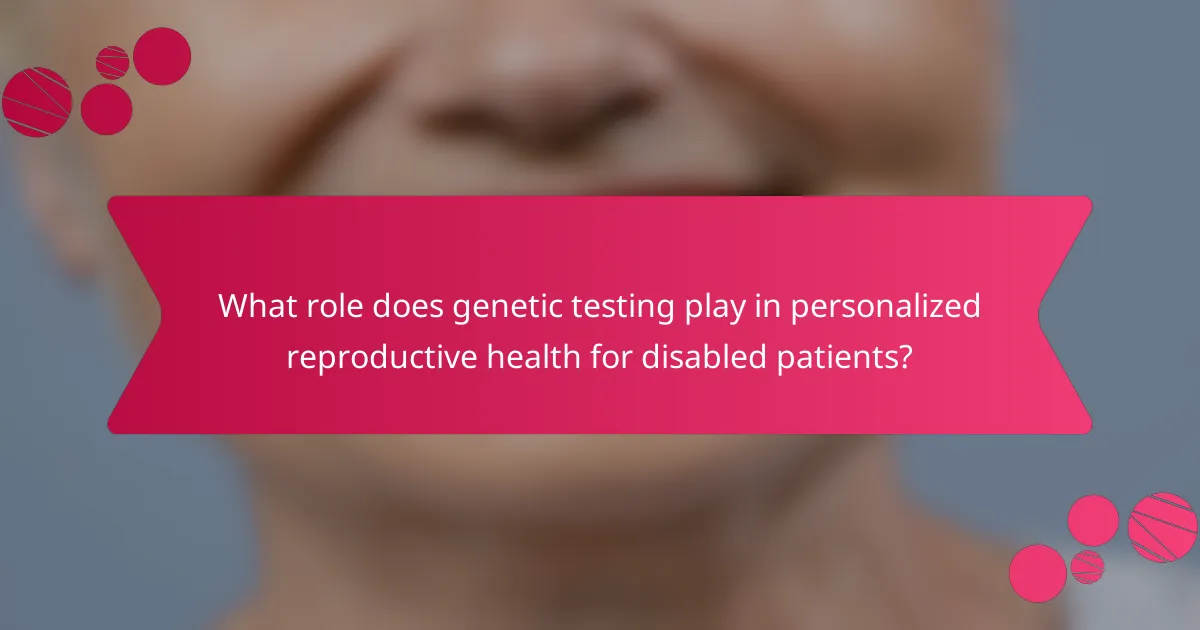
What role does genetic testing play in personalized reproductive health for disabled patients?
Genetic testing plays a crucial role in personalized reproductive health for disabled patients by identifying specific genetic markers that influence fertility and pregnancy outcomes. This tailored approach allows healthcare providers to offer targeted interventions and support, enhancing the chances of successful conception and healthy pregnancies. Genetic testing can reveal potential risks for genetic disorders, enabling informed decision-making regarding family planning options. Additionally, it can guide the selection of assisted reproductive technologies that align with the unique needs of disabled patients, ultimately improving their reproductive health experiences.
How can genetic information inform treatment options in reproductive health?
Genetic information can significantly enhance treatment options in reproductive health by enabling personalized medicine. This approach tailors interventions based on an individual’s genetic profile, improving outcomes for disabled patients. Genetic testing can identify specific mutations or genetic conditions that influence fertility and reproductive health.
For instance, patients with known genetic disorders may benefit from targeted therapies that address their unique needs. Additionally, genetic insights can guide decisions regarding assisted reproductive technologies, such as in vitro fertilization, by selecting the most viable embryos. This personalized approach not only optimizes treatment efficacy but also reduces the risk of adverse outcomes, making it a crucial element in modern reproductive health care.
Which specific genetic conditions are relevant for disabled patients seeking reproductive health services?
Specific genetic conditions relevant for disabled patients seeking reproductive health services include cystic fibrosis, sickle cell disease, and Tay-Sachs disease. These conditions can impact reproductive options and health outcomes. Genetic counseling helps patients understand risks and make informed decisions. Additionally, conditions like Down syndrome may also influence reproductive health considerations.
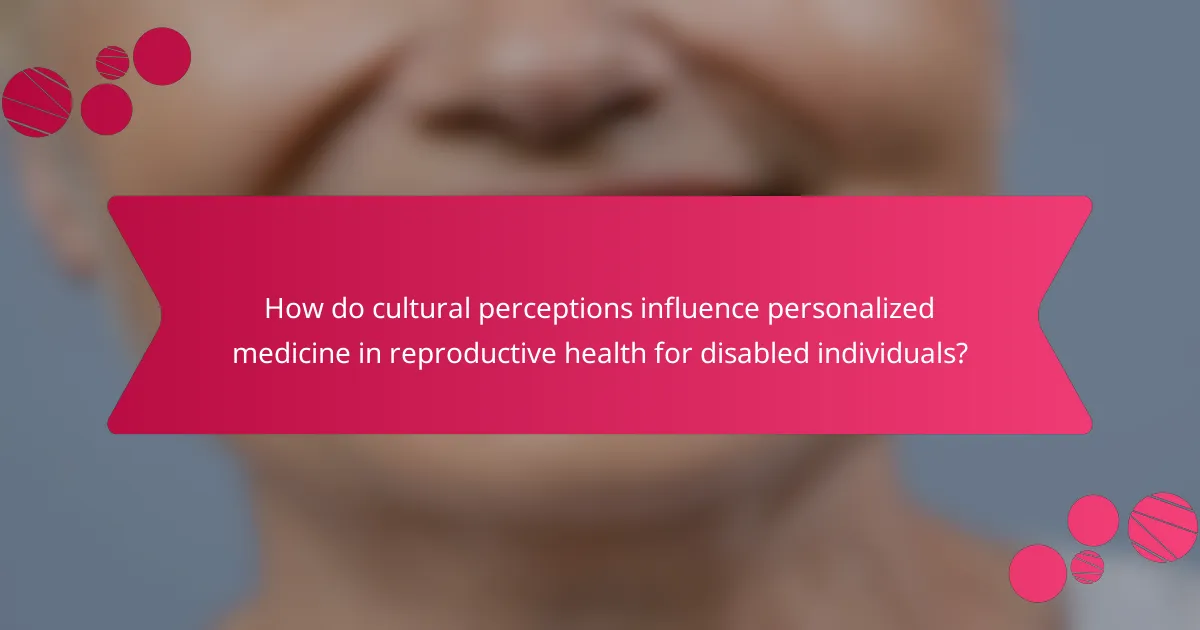
How do cultural perceptions influence personalized medicine in reproductive health for disabled individuals?
Cultural perceptions significantly shape personalized medicine in reproductive health for disabled individuals by influencing treatment preferences and accessibility. These perceptions can affect how healthcare providers approach individualized care, often prioritizing certain values over others.
For example, some cultures may emphasize traditional reproductive practices, impacting the acceptance of modern personalized medicine approaches. This can lead to disparities in access to tailored treatments that consider the unique needs of disabled patients.
Additionally, stigma surrounding disabilities can hinder open communication between patients and providers, limiting the effectiveness of personalized medicine. Addressing these cultural perceptions is crucial for enhancing reproductive health outcomes for disabled individuals.
Ultimately, understanding and integrating cultural beliefs into personalized medicine can foster a more inclusive and effective healthcare environment.
What are the differences in attitudes towards reproductive health among disabled patients across regions?
Attitudes towards reproductive health among disabled patients vary significantly across regions due to cultural, social, and healthcare access factors. In some areas, there is strong advocacy for personalized medicine approaches, enhancing reproductive health services tailored to individual needs. In contrast, other regions may exhibit stigmatization or lack of awareness, leading to inadequate support for disabled patients. For instance, urban areas often have better resources and education on reproductive health, while rural regions might face challenges in access and information. These differences highlight the importance of regional strategies in addressing reproductive health needs for disabled individuals.
How can healthcare providers address cultural sensitivities when offering personalized reproductive care?
Healthcare providers can address cultural sensitivities by incorporating personalized medicine approaches that respect diverse backgrounds. Understanding individual beliefs and values enhances reproductive care for disabled patients.
Providers should engage in active communication to identify cultural preferences and barriers. Training staff on cultural competence fosters an inclusive environment. Utilizing patient feedback helps tailor services effectively.
Incorporating holistic approaches that consider physical, emotional, and cultural needs leads to improved patient satisfaction. Acknowledging unique attributes of each patient ensures personalized care plans that resonate with their experiences.
As a result, culturally sensitive practices not only improve health outcomes but also empower disabled patients in their reproductive health journey.
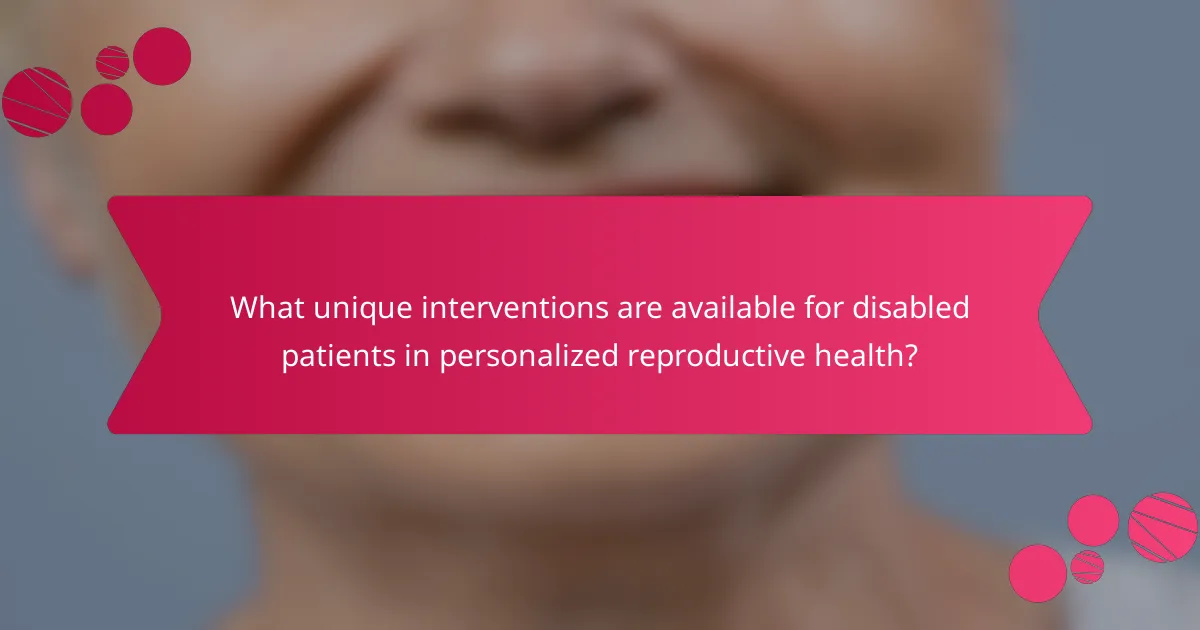
What unique interventions are available for disabled patients in personalized reproductive health?
Personalized medicine approaches in reproductive health for disabled patients include unique interventions tailored to individual needs. These interventions may involve advanced genetic screening, customized hormone therapy, and assisted reproductive technologies designed for specific disabilities.
For example, individuals with physical disabilities may benefit from adaptive reproductive technologies that facilitate conception and pregnancy. Additionally, psychological support services are integrated into personalized care plans to address emotional and mental health aspects.
Furthermore, telehealth services offer accessible consultations, ensuring that disabled patients receive timely advice and treatment options without travel barriers. These unique approaches enhance reproductive health outcomes for disabled individuals, promoting equity in healthcare access.
How do assistive technologies support reproductive health initiatives for disabled individuals?
Assistive technologies enhance reproductive health initiatives for disabled individuals by providing tailored support and accessibility. These technologies include telehealth platforms, fertility tracking apps, and adaptive devices, which facilitate communication and medical consultations. They empower users by ensuring informed decision-making and personalized care plans. Additionally, assistive technologies can address unique needs, such as mobility challenges or sensory impairments, enhancing overall reproductive health outcomes.
Which case studies highlight successful personalized medicine interventions in reproductive health for disabled patients?
Successful case studies in personalized medicine for disabled patients in reproductive health include tailored fertility treatments, genetic counseling for hereditary conditions, and customized prenatal care plans. These interventions demonstrate improved health outcomes and patient satisfaction. For example, a study showed that personalized IVF protocols led to higher success rates in disabled women. Another highlighted the impact of genetic screening in preventing inherited disorders, ensuring healthier pregnancies.
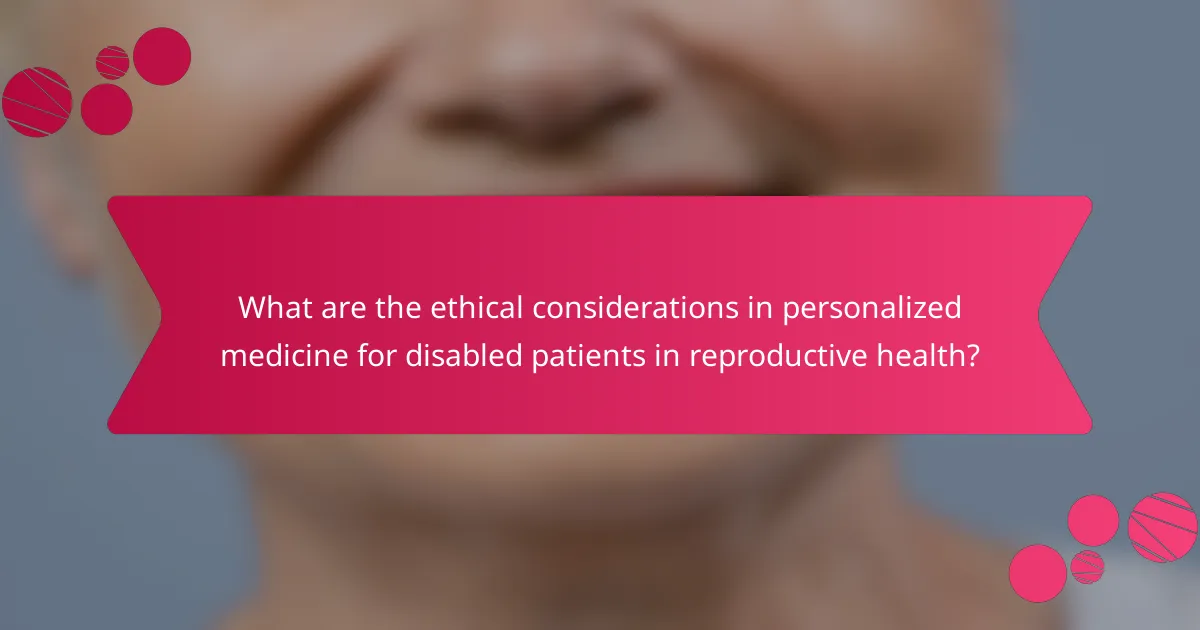
What are the ethical considerations in personalized medicine for disabled patients in reproductive health?
Ethical considerations in personalized medicine for disabled patients in reproductive health include informed consent, equitable access, and respect for autonomy. These factors ensure that patients receive tailored care while safeguarding their rights and dignity. For instance, informed consent must be comprehensive, addressing the unique needs of disabled patients. Equitable access ensures that all patients can benefit from advancements in personalized medicine, regardless of their disabilities. Respect for autonomy emphasizes the importance of empowering patients to make informed decisions about their reproductive health.
How do informed consent processes differ for disabled patients in reproductive health contexts?
Informed consent processes for disabled patients in reproductive health contexts prioritize clear communication and accessibility. These processes often involve tailored information delivery methods, such as visual aids or simplified language, to ensure understanding.
Disabled patients may require additional support to navigate complex medical information. This includes having access to advocates or support persons during consultations, which can enhance comprehension and comfort.
Furthermore, the ethical considerations surrounding autonomy and decision-making are heightened for disabled individuals. Healthcare providers must ensure that consent is truly informed and voluntary, recognizing the unique challenges faced by these patients.
In summary, informed consent for disabled patients in reproductive health emphasizes accessibility, support, and ethical considerations, reflecting their specific needs and rights.
What are the implications of genetic privacy for disabled individuals seeking personalized reproductive care?
Genetic privacy significantly impacts disabled individuals seeking personalized reproductive care by influencing their willingness to share sensitive information. Concerns about discrimination and data misuse can deter engagement with personalized medicine approaches. Ensuring robust privacy protections fosters trust, encouraging disabled patients to access tailored reproductive options. This aligns with the unique attribute of personalized medicine, which aims to address individual needs effectively. Additionally, the implications extend to ethical considerations, emphasizing the importance of informed consent and safeguarding personal genetic data.
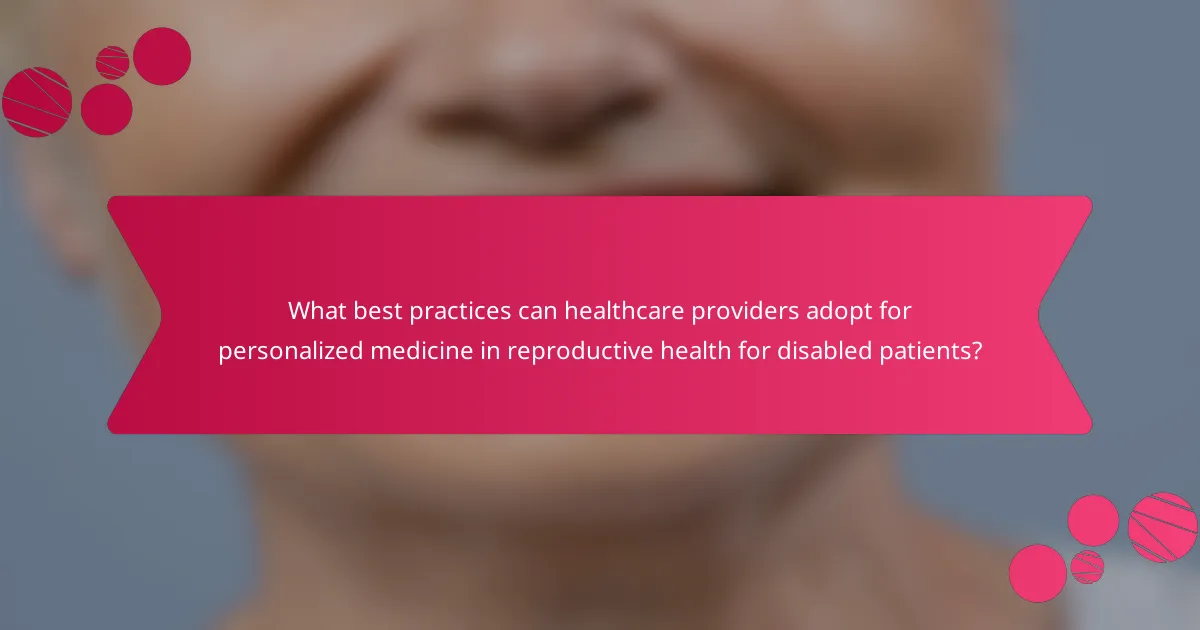
What best practices can healthcare providers adopt for personalized medicine in reproductive health for disabled patients?
Healthcare providers can enhance personalized medicine in reproductive health for disabled patients by adopting several best practices. These practices include comprehensive patient assessments, integrating multidisciplinary teams, and utilizing advanced technologies.
First, conducting thorough patient assessments is crucial. This ensures that healthcare providers understand individual health needs, preferences, and potential barriers to care.
Next, integrating multidisciplinary teams can improve outcomes. Collaboration between specialists, such as geneticists, obstetricians, and mental health professionals, allows for a holistic approach to patient care.
Finally, utilizing advanced technologies, such as telemedicine and genetic testing, can facilitate personalized treatment plans. These tools can help in tailoring interventions based on specific patient attributes, thereby enhancing the overall quality of care.
How can interdisciplinary collaboration improve outcomes in personalized reproductive health care?
Interdisciplinary collaboration enhances personalized reproductive health care by integrating diverse expertise. This approach leads to tailored treatment plans that consider the unique needs of disabled patients, improving overall health outcomes. For example, combining insights from genetics, psychology, and social work creates a holistic care model. As a result, patients receive more comprehensive support, addressing both medical and emotional aspects of reproductive health. Such collaboration fosters innovation, ensuring that interventions are not only effective but also sensitive to the complexities of individual circumstances.
What are common mistakes to avoid when implementing personalized medicine approaches in reproductive health?
Common mistakes in implementing personalized medicine approaches in reproductive health for disabled patients include inadequate patient assessment, lack of tailored treatment plans, and insufficient communication among healthcare providers. These errors can lead to ineffective interventions and poor outcomes. Additionally, overlooking the unique needs and preferences of disabled patients can hinder the personalization process. Failing to integrate multidisciplinary approaches may also limit the effectiveness of personalized medicine in this context.
